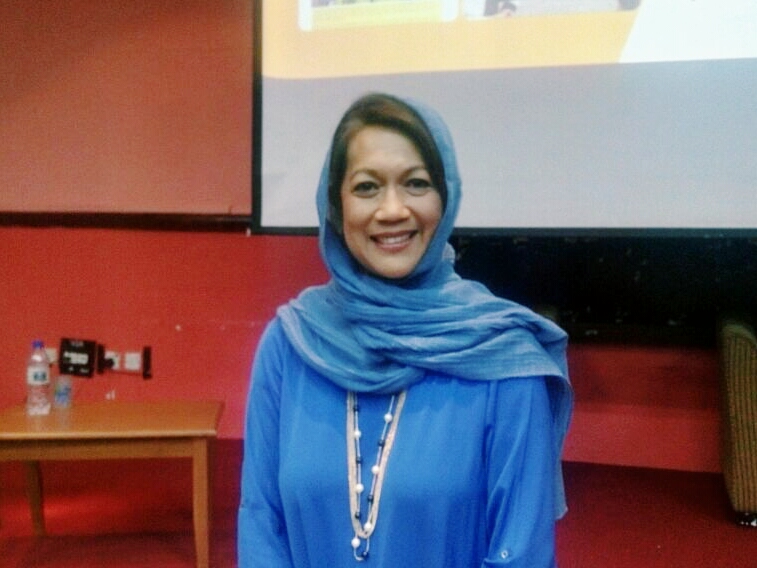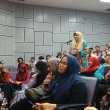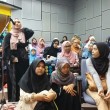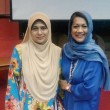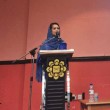By Azra Farzana Shuib
GOMBAK, 7 February 2017: As a broadcast journalist, reporting for a local television station from abroad does not only come with privileges, but with hard work and perseverance to face obstacles and overcoming challenges to get the tasks done, Haliza Hashim told a packed audience of communication students at the Mini Auditorium today.
Sharing her wealth of experiences as TV3 correspondent and broadcast journalist based in the United Kingdom (UK) for more than 20 years in a session titled “The Art of Story Telling”, Haliza told the audience that her task was to do good reporting on a number of issues and events taking place in Europe that touched the hearts and minds of the Malaysian public.
She cited a fiery passion that didnt die while carrying out a tough assignment in Ukraine after the Malaysia Airline aircraft MH17 was shot down in July 2014. Going through the daunting journey to the crash site, facing the troublesome checkpoints by the army, and having to bear the heart-breaking situation of seeing the remains of the crash, she described vividly the agony and pains she had to go through in reporting the news on scene.
Admitting the fact that her journey had not always been smooth, she said she had to learn to adapt fast to the situation and had to be creative all the time to get her job done. Often, there’s the urgent need for her to check and verify the sources and facts and to abide by certain ethical practices of a journalist.
In the process of carrying out her duties, she said, her editor would not be interested to know her problems on the ground or to tell her how to do the job, but had expected that her story be delivered by “hook” or by “crook”, which means she had to really work under pressure in fulfilling the deadline.
In some instances, she said, the editor was so busy to even pronounce her name “Haliza” in full, but just called her by alphabet”H” followed by the instruction to get on to the story. Sometimes there was not even an instruction but rather a call from the editor to alert her of the significant event, citing the Paris attack by terrorists as another example where she had to pack her luggage and rushed immediately to the French capital city by taking the first train from London to Paris the next morning.
Another tense moment was when she was doing a reporting in Geneva during the visit of former Prime Minister, Tun Mahathir Mohamad, to attend an important meeting there. She said there was a riot going on near the hotel she was staying where all hotel residents, including her, were prevented from leaving the hotel. But, she said, she had to leave the hotel immediately because the Prime Minister was arriving “at any time” and she needed to do the coverage. After several negotiations with the Swiss security she managed to convince them and in turn received their assistance whereby she was barely able to arrive her destination on time.
Haliza told the audience she did not have a degree in Mass Communication or Journalism. She did a diploma in Business Studies in UiTM and later went on to do a degree in Economics in Cardiff University. It was her special interest in writing during her university days that lured her to join TV3. She said she wanted to join the New Straits Times as a journalist but the offer to join TV3 came to her much earlier. So, as she had studied in the UK and married to a British she had asked her employer to be the station’s correspondent in London. She was first offered the job for two years and subsequently her contract was renewed year after year until today. She really had to prove herself to keep going, she added.
Earlier in 1993 when she first took up her job as a correspondent in London, one interesting challenge she faced was when she had to report on Malaysias badminton achievement in a tournament in England. In an era when mobile phone was not yet introduced, and lacking background knowledge in badminton, it was hard for her to do the reporting on the subject.
She had to request for newspaper cuttings from her colleagues in Kuala Lumpur on Malaysian badminton via fax, and even that did not help much when the papers she received were not even readable. Requesting for the repeat of the process was part of the challenge. In the end, she said, “I had to educate myself. Â I made an effort and took the initiative to arrive at the scene of the tournament much earlier to seek for more information from the Malaysian team. I also interviewed the coach to get the necessary background.”
Reporting on the death of a Malaysian student in the UK following an incident in a tube station in London, Haliza recalled her concern for journalism ethics and practices. She said she learned a lesson when doing such reporting, that it is important to get the consent from the next of kins first and to show respect for those who had lost their loved one.
On the art of reporting, she reminded aspiring media practitioners that in every manner of reporting, the ˜5Ws 1H rule is always important.
œBut there is one extra thing “ you cant really say what it is, but it has to be unique, it has to be amazing, different, and that makes the news.
Reminding the students on reporting for the target audience, she emphasised the importance of getting the right timing and paying attention to accuracy of every aspect of the story.
Responding to a question on motivation from the floor, she said, being active in her work she wanted to keep going. She said, œIts so easy to do a simpler job. Sadly, I thrive on working. The day you dont enjoy what you do, youre done.
Based on her experience of doing many stories in foreign lands, she advised the students to be sensible in reporting. œYou have to adapt wherever you are. Always put your story first ahead of your own self. Im not sure if its a good lesson to hold on to, but that is actually what keeps you going, she said.
Haliza plans to write a book to share her experiences and conduct more workshops. As for now, the writer, producer and emcee says, “I am not certain when to retire.” ***
